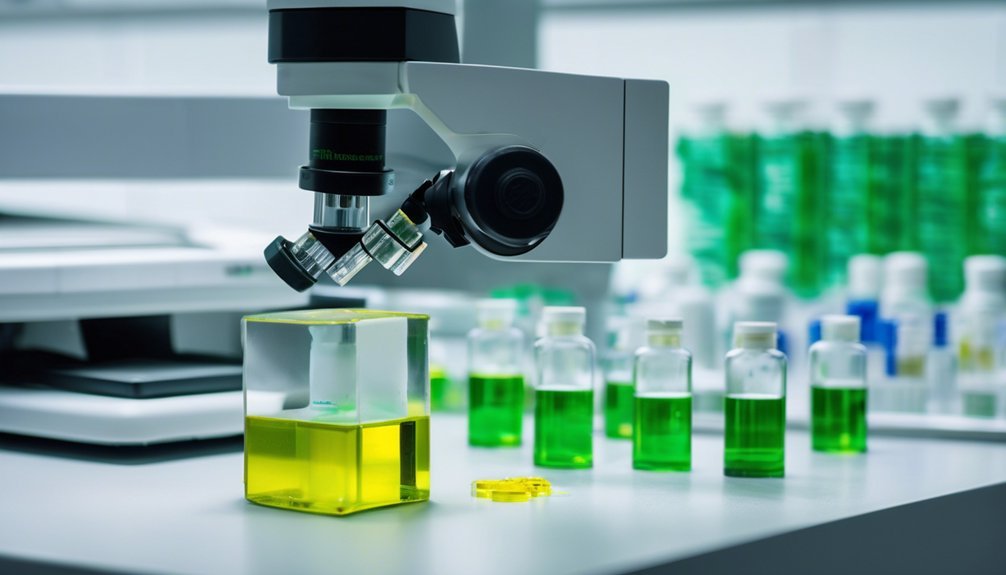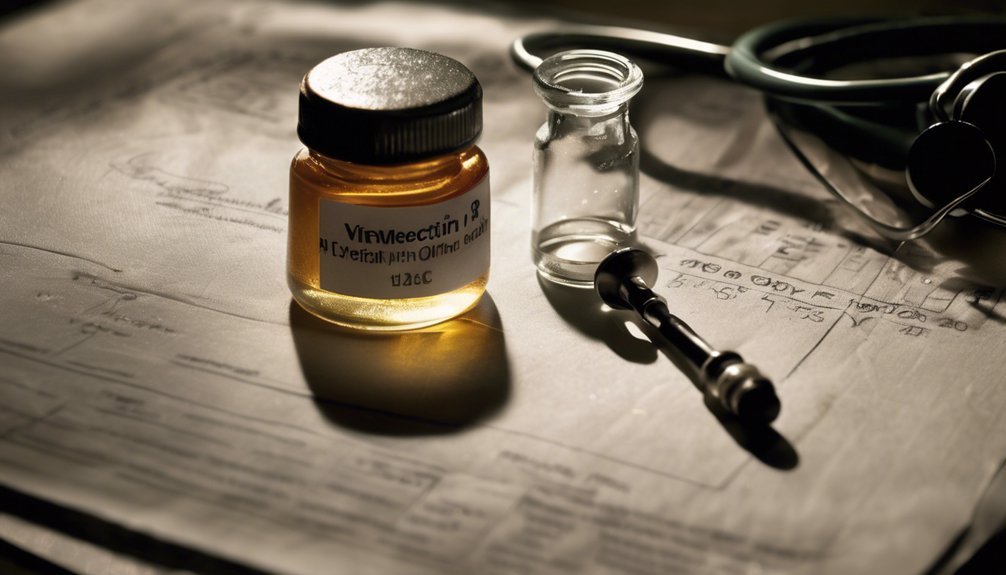When considering high-dose ivermectin for cancer treatments, it’s crucial to weigh the potential toxicity risks against its therapeutic benefits. Neurological symptoms, gastrointestinal disturbances, and hepatotoxicity are significant concerns that require vigilant monitoring. Additionally, interactions with other medications can complicate treatment. As research progresses, understanding these risks will play a vital role in determining safe usage parameters and optimizing patient outcomes. What implications do these findings have for future clinical applications?
Key Takeaways
- High doses of ivermectin may cause neurological symptoms such as dizziness and confusion, impacting patient safety.
- Gastrointestinal disturbances, including nausea and diarrhea, can affect treatment adherence and overall patient well-being.
- Hepatotoxicity is a potential risk, necessitating regular monitoring of liver function during high-dose ivermectin use.
- There is an increased risk of adverse drug interactions with other medications, complicating treatment regimens.
- Common side effects like fatigue and skin reactions may further hinder patient compliance and quality of life.
Understanding Ivermectin and Its Original Use

Although you may have heard about ivermectin primarily in the context of recent controversies, it’s essential to understand its original application as an antiparasitic agent. Developed in the late 1970s, ivermectin’s historical background reveals its role in treating parasitic infections, particularly in humans and animals.
Its mechanism exploration shows that it targets neurotransmission in parasites, leading to paralysis and death. This unique action highlights its efficacy in combating diseases like river blindness and lymphatic filariasis.
As you consider ivermectin’s applications, it’s crucial to recognize its foundational purpose, which has historically benefited countless individuals in underserved regions. Understanding this context can inform discussions on its potential uses and risks in other areas, including emerging research in oncology.
The Emergence of Ivermectin in Cancer Research
As researchers explore new avenues in cancer treatment, ivermectin has garnered attention for its potential antitumor properties. Emerging research indicates that this drug, traditionally used for parasitic infections, might play a role in inhibiting tumor growth.
Early clinical trials are investigating its effects on various cancer types, focusing on its ability to enhance the efficacy of existing therapies. Preliminary results suggest that ivermectin may improve patient outcomes when combined with chemotherapy.
However, it’s crucial to approach these findings with caution, as the safety and long-term effects of high-dose ivermectin remain under scrutiny.
Mechanisms of Action: How Ivermectin May Fight Cancer
Ivermectin’s potential to combat cancer lies in its multifaceted mechanisms of action, which researchers are beginning to unravel.
One significant aspect is its ability to induce cancer cell apoptosis, leading to the programmed death of malignant cells. By disrupting cellular processes, ivermectin can trigger pathways that promote this apoptosis, effectively reducing tumor viability.
Additionally, ivermectin plays a role in immune modulation, enhancing the body’s natural defenses against cancer. It appears to stimulate immune responses, allowing the immune system to more effectively target and eliminate cancer cells.
These mechanisms contribute to the growing interest in ivermectin as a potential adjunct therapy in cancer treatment, underscoring the need for further investigation to elucidate its full therapeutic potential.
Evidence Supporting Anti-Cancer Properties of Ivermectin

While ongoing research continues to explore the anti-cancer properties of ivermectin, several studies provide promising evidence supporting its efficacy in this area. Notably, research has demonstrated that ivermectin exhibits cytotoxic effects on various cancer cell lines, including breast, prostate, and leukemia cells.
In vitro studies illustrate that ivermectin can induce apoptosis and inhibit cell proliferation, suggesting a potential therapeutic role in oncology. Additionally, some investigations reveal that ivermectin’s ability to disrupt cellular signaling pathways may enhance the effectiveness of conventional cancer treatments.
As you consider the implications of these findings, it’s essential to recognize the need for further clinical trials to validate the ivermectin efficacy in cancer therapy and to ensure the safety and well-being of patients receiving such treatments.
Potential Toxicity Risks of High-Dose Ivermectin
Research into ivermectin’s anti-cancer properties highlights its potential therapeutic benefits, but it’s equally important to consider the associated risks, particularly when used at high doses.
Research indicates that while ivermectin may offer anti-cancer benefits, high doses pose significant risks that must be carefully evaluated.
A thorough toxicity assessment is crucial in understanding how high doses may lead to adverse outcomes. Here are key points to consider regarding potential toxicity risks:
- Neurological Effects: High doses may contribute to neurological symptoms, including dizziness and confusion.
- Gastrointestinal Disturbances: Elevated doses can cause nausea and vomiting, impacting overall patient health.
- Hepatotoxicity: There’s a risk of liver damage, necessitating careful monitoring of liver function.
- Drug Interactions: Increased doses may heighten the risk of adverse interactions with other medications.
Adhering to established dosage guidelines is essential for minimizing these risks.
Common Side Effects Associated With Ivermectin
Many patients using ivermectin may experience common side effects that can impact their overall treatment experience. Understanding these effects can help you manage them better. Common side effects include dizziness, nausea, diarrhea, and fatigue. It’s essential to report any severe symptoms to your healthcare provider, as they may indicate ivermectin toxicity.
| Common Side Effects | Description |
|---|---|
| Dizziness | A feeling of lightheadedness |
| Nausea | An urge to vomit |
| Diarrhea | Loose or watery bowel movements |
| Fatigue | Extreme tiredness or weakness |
| Skin Reactions | Rashes or itching |
Awareness of these side effects allows you to navigate your treatment more effectively and advocate for your health.
Assessing the Risk-Benefit Ratio in Cancer Treatments

When considering cancer treatments, it’s crucial to evaluate the risk-benefit ratio to make informed decisions about your health.
A comprehensive risk assessment helps you understand the potential outcomes and side effects of therapies like high-dose ivermectin.
Here are four key factors to weigh:
- Treatment Efficacy: Assess how effective the treatment is in combating your specific cancer type.
- Side Effects: Consider the severity and frequency of adverse effects associated with high-dose ivermectin.
- Alternative Options: Explore other treatment modalities that may offer better safety profiles.
- Long-Term Impact: Evaluate the potential for long-term health benefits versus the risks involved.
Balancing these factors is essential to ensure that your choice aligns with your overall health goals and values.
Regulatory Perspectives on High-Dose Ivermectin Use
While health authorities continue to evaluate the use of high-dose ivermectin, understanding the regulatory landscape is vital for patients and clinicians alike.
You’ll encounter various regulatory challenges that impact the approval processes for this treatment. Agencies like the FDA and EMA are scrutinizing available evidence to determine the safety and efficacy of high doses in oncology settings. This scrutiny often leads to prolonged evaluation periods, delaying access for patients who may benefit.
Clinicians must navigate these regulations carefully, as prescribing high-dose ivermectin outside approved indications can expose them to legal and ethical dilemmas. Staying informed about ongoing regulatory developments is crucial for making evidence-based decisions that prioritize patient safety and therapeutic effectiveness.
Case Studies: Outcomes of High-Dose Ivermectin in Oncology
Although high-dose ivermectin remains controversial, case studies in oncology provide valuable insights into its potential outcomes.
Through case study analysis, clinicians have documented varying treatment outcomes that may inform future therapeutic strategies:
- Efficacy in Tumor Reduction: Some patients showed significant tumor size reduction, suggesting possible benefits in specific cancer types.
- Adverse Effects: Reports of toxicity, including neurological symptoms, highlight the need for careful monitoring.
- Patient Demographics: Outcomes appear to differ across age groups, emphasizing personalized approaches.
- Combination Therapies: When used alongside standard treatments, ivermectin’s role in enhancing efficacy merits further exploration.
These findings underscore the complexity of integrating high-dose ivermectin into cancer care, advocating for rigorous research to establish safety and effectiveness.
Future Directions in Ivermectin Research and Cancer Therapy

As researchers explore the potential of high-dose ivermectin in cancer therapy, several future directions warrant attention to enhance its therapeutic profile.
First, clinical trials should focus on dosage optimization to identify the most effective therapeutic windows while minimizing toxicity.
Investigating combination therapies with established cancer treatments could improve outcomes and broaden efficacy.
Patient selection based on biomarker identification may ensure that the right individuals receive ivermectin, enhancing safety profiles and treatment responses.
Additionally, pharmacokinetics studies can elucidate long-term effects and inform proper dosing strategies.
Finally, considering alternative treatments alongside high-dose ivermectin may provide a comprehensive approach to cancer therapy, ultimately improving patient care and outcomes in this challenging field.
Frequently Asked Questions
Can Ivermectin Interact With Other Cancer Medications?
Ivermectin can indeed interact with other cancer medications, affecting treatment protocols. You should consult healthcare professionals to assess potential drug interactions, ensuring safe and effective management of your treatment plan for optimal patient outcomes.
What Are the Long-Term Effects of High-Dose Ivermectin?
Long-term effects of high-dose ivermectin may involve dose-dependent toxicity, including potential neurological and gastrointestinal issues. You should monitor patients closely, assessing any adverse reactions that could arise from prolonged high-dose administration.
Is Ivermectin Safe for All Cancer Patients?
Is ivermectin safe for all cancer patients? While it may seem straightforward, patient eligibility criteria and ivermectin dosage guidelines reveal complexities. Always consult a healthcare professional to ensure the treatment aligns with individual health needs and conditions.
Are There Specific Cancers Where Ivermectin Is More Effective?
Ivermectin’s efficacy varies across cancer types, with some research suggesting potential benefits in specific malignancies. You should consult clinical studies and oncologists for a comprehensive understanding of its effectiveness tailored to individual cancer scenarios.
How Is High-Dose Ivermectin Administered in Clinical Settings?
In clinical settings, you’ll find high-dose ivermectin administered via specific dosage protocols, often intravenously or orally, depending on patient needs. Administration methods vary, ensuring optimal delivery while adhering to safety and efficacy standards.
Conclusion
In summary, while high-dose ivermectin shows potential in cancer treatment, its toxicity risks can’t be overlooked. For instance, a hypothetical patient undergoing high-dose therapy might experience severe gastrointestinal disturbances and elevated liver enzymes, necessitating hospitalization. This underscores the critical need for careful monitoring and individualized treatment plans. Balancing the potential benefits against these risks is essential, highlighting the importance of ongoing research to refine safe dosage guidelines and optimize patient outcomes in oncology.




